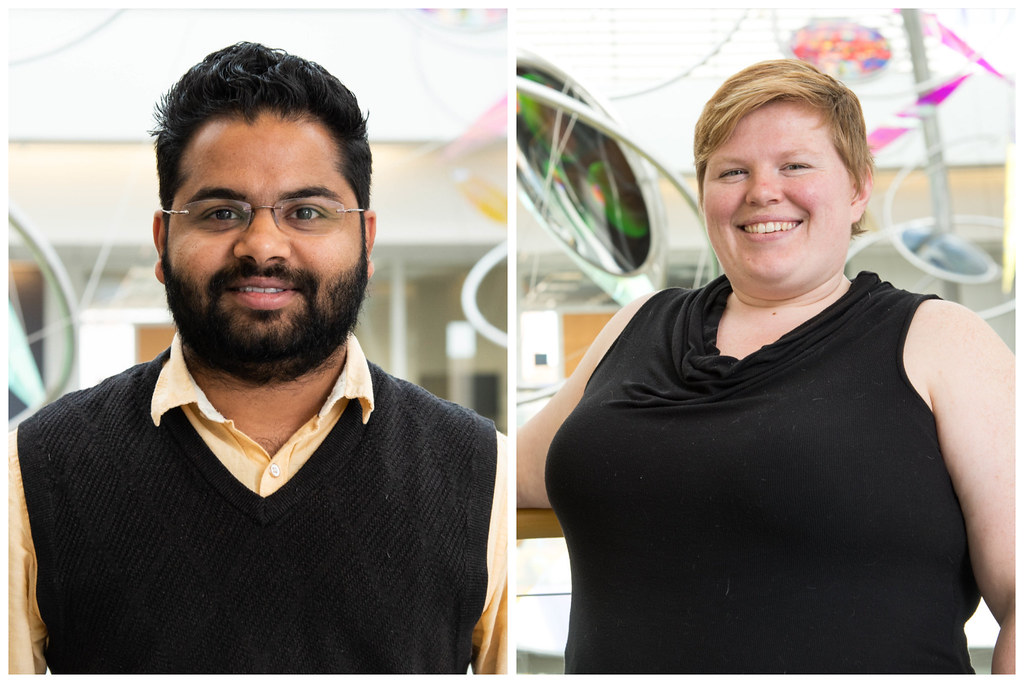Published on
Two Bond Life Sciences Center researchers find their path in teaching and research
By Mariah Cox | Bond LSC
As one semester closes and another begins, Sarah
Unruh finds herself at the start of a new chapter of her life—this time at the
front of the classroom. A newly appointed assistant professor at Illinois
College, Unruh only had a handful of weeks to create syllabi, craft lesson
plans and pack up her entire life to prepare for the start of classes on Jan.
14.
For Unruh, a recent Ph.D. graduate in biology in the
Chris Pires lab, the quick turnaround and placement at Illinois College was
somewhat serendipitous in her career timeline. Throughout her doctoral program,
Unruh always thought her next step would be a postdoctoral fellowship.
“Toward the end of my Ph.D. I really could have
taken a little bit more time, but my collaborator emails me out of the blue with
a job that might be interesting if the timing works,” Unruh said. “There was no
mention of where it was just a link to the application.”
So, Unruh took the leap and applied for the position
this past February. And, get this—it was the only thing she applied for post-graduation.
Although the college was looking to fill a faculty
gap for the fall semester, her connection with a colleague allowed time for her
to finish her degree and begin the position in the spring. After an arduous
application and multi-step interview process, Unruh is pleasantly surprised
about the opportunity before her and is looking forward to becoming an
established faculty member in her new home.
During her doctoral program, Unruh taught labs
through assistantships for a handful of classes including plant systematics,
genetics and botany. While many of Mizzou’s classes can often enroll more than
100 students, she fell in love with the small classes that science labs afford.
“When I applied, I really liked the idea of a
smaller school and being able to invest in students in a smaller classroom
setting,” Unruh said. “When I was a TA, my role was facilitating the lab based
on content provided by the professor. However, for plant systematics, I had to
come up with the writing-intensive curriculum and that was a really good
experience. In addition to working with the students, I was able to critically
think about what makes a good assignment and what I wanted them to learn.”
Unruh is not a tenure track faculty yet, but she
hopes to covert to tenure track within the next couple of years. In the spring
she will teach molecular cell biology and introductory biology, each with a
lab. Additionally, she will have her own research lab that will study the
interaction between mycorrhizal fungi and endangered orchid species.
Illinois College is an undergraduate institution
that heavily encourages students to participate in research opportunities. With
her experience mentoring student researchers in the Pires lab, Unruh is
especially excited about that aspect of her position.
“The relationships I’ve really forged [here at
Mizzou] have been with the students that come to the lab,” Unruh said. “Through
my teaching assistantships, I really liked and do still like interacting with
the students.”
For Unruh and many other students like her, her
discovery of research scientist and professor as a career path is backed by a
long list of experiences and steppingstones that directed her path. Unruh knew
she wanted to teach the summer after her freshman year of high school when she
became a volunteer and then camp counselor at the St. Louis Zoo, a position she
stayed at for seven summers.
“That was where I fell in love with education as
something I could do, and not only liked it, but realized I wanted to do that
and was good at it,” Unruh said. “It was a space where I came into my voice a
little bit because I’m definitely an introvert, but there you have to learn how
to get kids excited and be really loud and present.”
From there, her research in the Pires lab solidified
her desire to become a professor, rather than teach K-12.
Unruh is not alone in pursuing teaching
opportunities after earning a Ph.D.
Current Bond LSC researcher Vinit Shanbhag is also
on the path to soon step into a research scientist and professor role. In 2018,
Shanbhag was selected for the Preparing Future Faculty (PFF) Program, a
one-year program that seeks to prepare doctoral students and postdoctoral
scholars for future faculty roles and job expectations.
Through the program, Shanbhag was able to be an
independent instructor for undergraduate-level biochemistry courses. Other aspects
of the program included continuing research in Michael Petris’ lab and engaging
in professional development opportunities. This highly competitive fellowship
program accepts only four fellows from applicants worldwide.
“After my fellowship, I’m leaning toward an academic
rather than an industry position. With tenure track faculty positions, there’s
a teaching requirement. The program helped increase my confidence in my
teaching skills,” Shanbhag said.
After finishing up his current research project in
the Petris lab, Shanbhag is looking forward to applying to an R1 or R2
institution and setting up his own lab with the goal of continuing his research
on copper and cancer.
“The fellowship was great. Especially being an
international fellow, I wasn’t sure whether my students could understand my
English,” Shanbhag sad. “I got good reviews from the students so that allowed
me to analyze what I was doing right and what I could improve on.”
From various volunteering, teaching, fellowship or
research experiences, the path to becoming a research professor looks different
for everyone. But one thing’s for certain—they’re all invested in contributing
to science and inspiring the next generation to do so as well.
